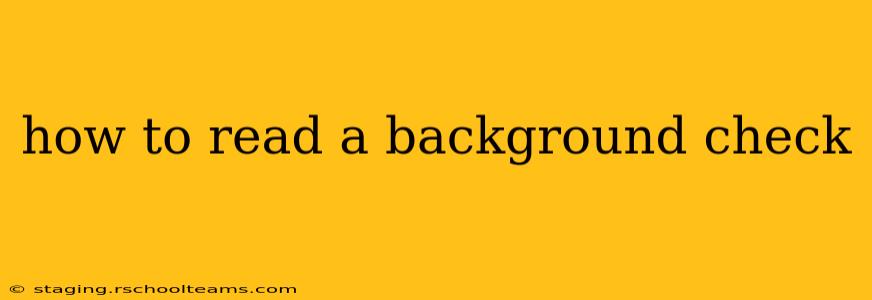Understanding the information contained within a background check can be daunting, but it's a crucial skill for both employers and individuals. This comprehensive guide will break down the key components of a background check report, explain what each section means, and offer tips on interpreting the results effectively.
What Information is Typically Included in a Background Check?
A standard background check typically includes several key areas, which may vary slightly depending on the specific provider and the purpose of the check. These commonly include:
-
Personal Information: This section verifies basic identifying details like full name, date of birth, social security number, addresses (current and previous), and sometimes aliases. Any discrepancies here could indicate a potential identity issue.
-
Criminal History: This is often the most scrutinized section. It details any felony or misdemeanor convictions, arrests (even if charges were dropped), and pending cases. The report will typically include the date of the incident, location, charges filed, and disposition (e.g., conviction, acquittal, dismissed). Understanding the nuances of different legal outcomes is crucial.
-
Employment History: This section verifies past employment, including dates of employment, job titles, and employer contact information. Inconsistencies here may raise red flags.
-
Education History: Similar to employment history, this verifies educational credentials claimed by the individual. It often includes the name of the institution, degrees earned, and dates of attendance.
-
Credit History (optional): Not all background checks include this, but if it's included, it shows an individual's credit score, payment history, debt levels, and public records relating to financial matters. This can be helpful in assessing financial responsibility.
-
Driving Records (optional): This section displays the individual's driving history, including accidents, traffic violations, and license suspensions or revocations. This is especially relevant for jobs involving driving.
-
Professional Licenses & Certifications (optional): This section verifies professional licenses or certifications held by the individual, ensuring they are valid and up-to-date.
How to Interpret the Information: Key Considerations
Reading a background check isn't just about identifying red flags; it's about understanding context.
1. Understand the Scope of the Report
Remember that background checks only provide a snapshot of an individual's past. They don't tell the whole story. Consider the age of the information: older records might be less relevant than recent ones.
2. Focus on the Severity and Recency of Incidents
Not all offenses are created equal. A minor traffic violation years ago is vastly different from a recent felony conviction. The recency of incidents is a critical factor in assessing risk.
3. Look for Patterns and Explanations
Multiple minor offenses might be more concerning than a single serious offense years ago. Also, look for any explanations provided by the individual regarding past incidents. Transparency and willingness to address past mistakes can be positive indicators.
4. Verify Information
It's vital to verify information from multiple sources, especially if there are discrepancies or concerns. Never rely solely on the background check report.
5. Consult with Legal Counsel
If you're unsure how to interpret specific information or have questions about legal implications, consult with a qualified attorney.
H2: What Does a "Clean" Background Check Mean?
A "clean" background check generally means that no significant negative information was found during the screening process. This doesn't necessarily mean the individual is perfect, only that the background check revealed no criminal convictions, serious traffic violations, or other significant issues within the scope of the report. It's important to note that the definition of "clean" can vary based on the specific requirements of the job or the organization conducting the check.
H2: What if I Find Errors in My Background Check?
If you find errors in your background check, immediately contact the reporting agency and the company that commissioned the check. You have the right to dispute inaccurate information. Follow the agency's dispute resolution process carefully and provide documentation to support your claims.
H2: Are There Different Types of Background Checks?
Yes, there are several types of background checks, each varying in scope and depth:
-
Basic Background Checks: These include name verification, address history, and sometimes criminal record checks.
-
Comprehensive Background Checks: These are more thorough, including criminal history, credit history, employment verification, education verification, and sometimes driving records.
-
National Background Checks: These search databases across the entire country.
-
State-Specific Background Checks: These focus specifically on a particular state's records.
The type of background check used will significantly impact the information contained within the report.
H2: Is a Background Check Legal?
The legality of background checks varies depending on the jurisdiction and the specific type of check conducted. However, in many cases, background checks are permissible if conducted appropriately and in compliance with applicable laws and regulations, including the Fair Credit Reporting Act (FCRA). It's essential to be aware of and comply with relevant regulations.
This guide provides a general overview of how to read a background check. Remember that the interpretation of this information requires careful consideration and may benefit from professional advice. Always consult relevant legal resources and guidelines when making decisions based on background check information.
